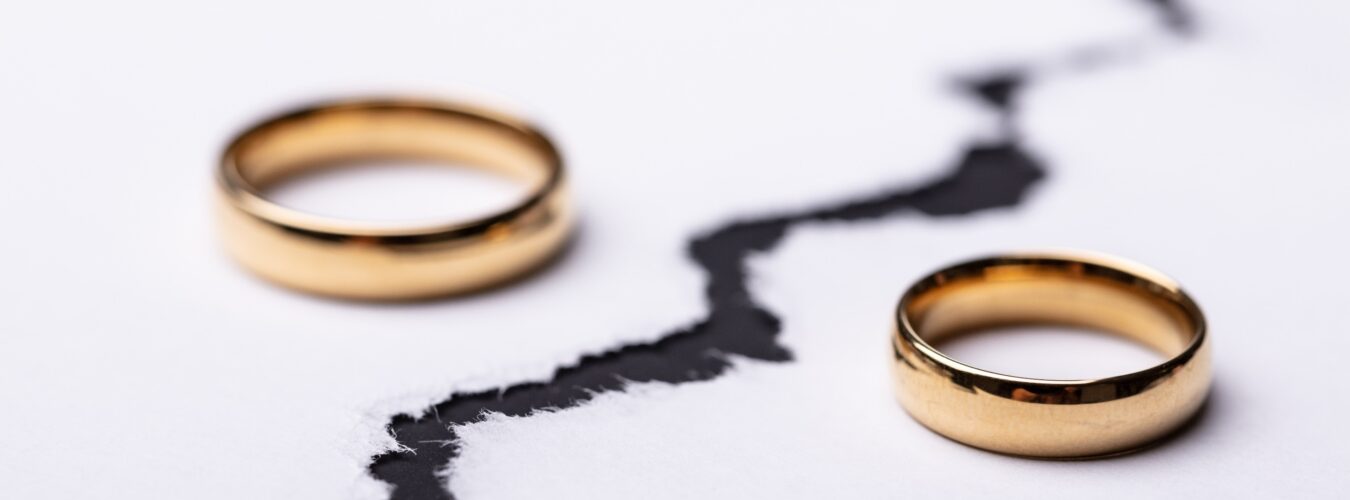Contents
For a short summary of the tax implications of divorce, read our article Understanding the tax implications of divorce.
An overview of Taxation and Divorce
It is essential to seek advice on the UK tax implications of separation, divorce and any proposed settlement at the earliest opportunity.
By planning a divorce settlement carefully, you should be able to minimise the tax cost of transfers under the settlement. This can help to leave as much as possible for distribution between the divorcing spouses.
Note that where we mention ‘spouses,’ this includes civil partners but not cohabiting couples. Cohabiting couples are always treated as two individuals without the tax advantages of marriage or civil partnership.
Income Tax, Capital Gains Tax (CGT) and Inheritance Tax (IHT) all need to be considered in formulating a divorce settlement, and when establishing the tax position for both parties going forward once the settlement has been made.
In this article, you’ll find an overview of each of these taxes when it comes to divorce. The most important point, however, is that there is no immediate tax charge on the transfer of assets under a divorce settlement for Income Tax, CGT or IHT purposes.
For tax purposes, the important date is usually the date on which the couple ceases to live together permanently or are separated under a court order. They do not actually need to be living in separate homes, as this may not be possible for financial reasons or to minimise impact on children.
Conversely, just because a couple are living in separate homes, this does not mean that they are separated for tax purposes. It may just suit their lifestyle or job opportunities.
CAPITAL GAINS TAX (CGT)
CGT in Divorce – GENERAL PRINCIPLES
Spouses are taxed as separate individuals, and each is potentially subject to CGT on any chargeable gains arising from asset disposals. The definition of a disposal includes not only the sale of an asset, but also a gift or a transfer under a divorce settlement.
Transfers of assets between spouses who are living together, however, are deemed to take place on a ‘no gain’ and ‘no loss’ basis.
Each individual has an annual exemption (£6,000 for 2023/24, reducing to £3,000 for 2024/25), so any chargeable gains below this are not subject to CGT. Any chargeable gains in excess of the annual exemption are subject to CGT.
Gains on residential property are subject to tax at:
- 18% for basic-rate taxpayers and
- 28% for higher-rate taxpayers (reducing to 24% from 6 April 2024).
Other gains are generally taxed at 10% and 20%, respectively.
Business Asset Disposal Relief (formerly Entrepreneurs’ Relief) can apply to chargeable disposals of certain assets (for example, shares in a family trading company or an interest in a business) so that CGT is charged at 10%. Be aware though, that specific conditions must be met for this relief to apply.
Losses arising to individuals can be offset against their chargeable gains. Losses are offset firstly against gains arising in the same tax year. If the losses exceed the gains in that same year, they can be carried forward indefinitely to be offset against future chargeable gains, to the extent that they exceed that year’s annual exemption.
Gains arising on the disposal of certain assets, such as cars (including vintage cars), chattels with a value of less than £6,000 and foreign currency, are exempt from CGT.
CGT AFTER SEPARATION
Spouses are treated as ‘connected persons’, and this remains the case throughout a period of separation and divorce proceedings until the Final Order (formerly known as Decree Absolute) is obtained.
Usually, transfers between connected parties are treated as made at market value.
For disposals after 6 April 2023, the ‘no gain’ ‘no loss’ rule mentioned above will continue to apply for three years from the end of the year of permanent separation. Furthermore, this rule applies indefinitely to assets transferred as part of a formal divorce agreement (usually a Court Order).
Prior to 6 April 2023, the beneficial ‘no gain’ ‘no loss’ rules only lasted until the end of the tax year of separation. This could be difficult if the separation took place later in the year.
For any transfer of assets (not the subject of a formal agreement) between the separated spouses, after three full tax years after separation and up to the point at which the final order ) is obtained, the connected party rules will apply.
This means that transfers between separated spouses are treated as having been made at the open market value of the asset in question, at the date of transfer.
This can result in a capital gain for the transferor even though they have received no cash to pay the tax. In certain circumstances, holdover relief may be available.
If losses arise in these circumstances, they are known as ‘clogged losses’ and may only be set off against chargeable gains arising from transfers to the recipient spouse while they remain connected to the transferor, i.e., before the Final Order.
Where it is not possible or desirable to complete transfers within three tax years of separation (and transfers are contemplated subsequent to this period but prior to the Final Order), the capital gains position for any assets which are proposed to be transferred should be reviewed.
A review of this kind may enable the CGT burden across the family to be minimised by balancing the assets to be transferred at a gain with assets to be transferred at a loss This could help the transferor to offset any clogged losses as far as possible and avoid wasting them.
Even if assets are transferred on a ‘no gain’ ‘no loss’ basis, so the transferee acquires the base cost of the transferor, consideration should be given to any inherent gain in the asset.
For example, if…
- one partner assumes 100% ownership of a property worth £500k, with an original base cost of £150k, and
- the other partner assumes 100% ownership of a property also worth £500k, but with a base cost of £350k
… the first partner should be compensated elsewhere in the settlement for the higher CGT they will have to pay on the eventual disposal of the property.
TRANSFERS FOLLOWING final order
Former spouses are no longer treated as connected post The Final Order. Any transfers are, therefore, no longer automatically deemed to take place at market value (but will be if the transfer is regarded as not on arm’s length terms). Otherwise, gains or losses are calculated based on actual consideration received. Losses arising from transfers may be used against any gains arising to the transferor rather than only those made on disposals to the recipient’s former spouse.
TRANSFER OF THE FAMILY HOME
The family home often forms a significant part of overall family wealth and the home itself or the proceeds on sale may form an important part of any divorce settlement.
GENERAL PRINCIPLES
Gains on the disposal of an individual’s main residence are usually exempt from CGT. A married couple, or civil partners, can only have one main residence between them. If a number of properties are owned by the couple, it is possible to elect one of the properties to be treated as their main residence (even if it is owned in the sole name of one spouse rather than jointly).
Elections, in this case, must be made within 2 years of a change in a combination of residences – for example, when a new residence is bought or sold.
In the absence of an election, the couple’s main residence will be determined based on the facts of the situation. If an individual has lived in a property as their main home at any point, the last 9 months of ownership are treated as a period of residence regardless of whether that individual lived in the property during that time or not. In certain cases, this period is 36 months.
If the spouses use more than one property as a residence, the capital gains position for each should be reviewed at an early stage to see whether there is scope for making an election or varying an existing election to minimise CGT across the properties overall. It should be noted that a residence need not be owned; a rented flat also counts.
SALE OF PROPERTY AND DIVISION OF PROCEEDS
Where the family home is to be sold and the proceeds divided between the spouses under the divorce settlement, any gain on the sale will be exempt from CGT in the hands of both:
- the spouse who remains living in the home at the date of sale and
- the departing spouse,
… as long as the sale (exchange of contracts) takes place within 9 months of the departing spouse having left the family home.
If the property is sold more than nine months after a spouse has left and to an unconnected third party, special relief is available as long as:
- the departing spouse has not acquired another main residence and
- the remaining spouse has lived in the property until sale.
If the departing spouse has elected for another property to be treated as their main residence following departure, any gain on the former family home relating to the period following the election will be taxable in the hands of the departing spouse.
TRANSFER OF PROPERTY TO OCCUPYING SPOUSE
In certain cases, the departing spouse either owns the family home in their sole name or owns the home jointly with the occupying spouse, and then transfers the home to the occupying spouse under the divorce settlement.
In situations like this, it’s possible for the departing spouse to claim that the home should be treated as continuing to be their main residence from the date they left it until the date it is transferred to the remaining spouse. Where this claim is made successfully, there will be no charge to CGT on the transfer to the occupying spouse.
This claim cannot be made where the departing spouse has elected to treat another property as their main residence. It can also only be made in cases where the departing spouse’s former interest in the family home is to be transferred to the occupying spouse rather than sold and where the occupying spouse continues to live in the property as their main home.
NON-UK PROPERTY
If the separating spouses own foreign assets (such as a holiday home) that are to be transferred as part of the divorce settlement, the impact of foreign currency movements on the capital gains position on the disposal will need to be considered.
In the same way, as for any other chargeable asset, the acquisition cost and value on disposal of a property will be calculated by reference to sterling at the relevant dates.
This can give rise to seemingly paradoxical results, whereby the value of a property may have decreased in local currency terms but have increased in sterling terms (or vice versa) as a result of movements in exchange rates.
In addition, local taxation issues will need to be considered when transferring foreign property under a divorce settlement. Through our membership of AGN International, the worldwide association of separate and independent accounting and consulting firms, we can obtain advice on these issues across many jurisdictions.
TAXATION ON DIVORCE – INCOME TAX
Spouses are taxed independently of each other on income they receive in the tax year and this continues during the period of separation and after the Final Order.
Each spouse is usually entitled to an income tax personal allowance (£12,570 for 2023/24). The transfer of any assets under a divorce settlement is not in itself subject to income tax. However, if an individual is allocated income-generating assets like shares or interest-bearing cash bank accounts under a divorce settlement, they will be subject to tax on any income which subsequently arises on the assets they receive.
Other points to bear in mind are:
- Individuals are treated as no longer married for Income Tax purposes from the date of permanent separation.
- Entitlement to Marriage Allowance ceases on divorce or legal separation. Either partner can contact HMRC by phone or online to cancel.
Taxation on Divorce – Inheritance Tax (IHT)
Transfers between spouses or civil partners are exempt from IHT and this remains the case throughout a period of separation and until the Final Order is obtained.
The exemption is limited to a lifetime total of £325,000 if a transfer is being made from a UK-domiciled spouse to a non-UK-domiciled spouse. There is no limit on the exemption for transfers from a non-UK-domiciled spouse to a UK-domiciled spouse or where both spouses are non-UK-domiciled.
HMRC accepts that transfers of property that take place after the Final Order (but are made under the terms of a court order in relation to the divorce proceedings) are exempt from IHT as long as there is no intention of conferring any gratuitous benefit on the recipient. Maintenance payments to a former spouse or civil partner are also exempt from IHT.
Any other transfers between former spouses after the Final Order are treated as Potentially Exempt Transfers and, under current legislation, are exempt from IHT if the donor survives for 7 years following the date of the gift.
Can we help?
Given the financial complexities involved, we strongly recommend getting specific advice before making a divorce settlement. Speak with your usual Shipleys contact or one of our specialists shown on this page.
Specific advice should be obtained before taking action, or refraining from taking action, on any of the subjects covered above. If you would like advice or further information, please speak to your usual Shipleys contact.
Copyright © Shipleys LLP 2024
















